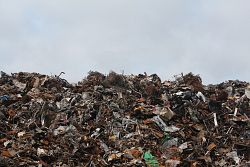

Following an investigation by the Environment Agency, one of the UK's largest waste management companies, Biffa Waste Services Ltd, has been ordered to pay a total of £599,912 for breaching waste exports regulations.
In June 2019 Biffa was found guilty of sending contaminated household waste, described as waste paper, to China between May and June 2015. Exports of unsorted household recycling waste from the UK to China are banned.
During the investigation, officers prevented seven 25-tonne containers at Felixstowe Port from onward transport to China. Despite being marked as waste paper, the contents included soiled nappies, food packaging, items of clothing, bags of faeces, wood, tin cans, plastic bottles and electric cables.
In September 2019 Wood Green Crown Court heard brief details about four further charges against Biffa illegally exporting 42 containers of waste collected from households to India and Indonesia between November 2018 to February 2019.
The Court fined Biffa £350,000, ordered them to pay costs of £240,000, and a further £9,912 under the Proceeds of Crime Act 2002 (POCA).
The Environment Agency has introduced a number of additional measures to tackle illegal exports, including working closely with HMRC to review inconsistencies between customs information and packaging data, and creating an investigations team to target serious offenders.
Pleased with the court's decision, Malcolm Lythgo, Head of Waste at the Environment Agency, said "illegal waste export blights the lives and environment of those overseas. We continue to treat illegal waste exports as a priority and will not hesitate to take appropriate enforcement action against those found to break the rules".
Between 2018 and 2019 the Environment Agency prevented the illegal export of 12,690 tonnes of unsuitable waste and are working with the Government on measures to tighten controls, including increasing monitoring of international waste shipments and charging higher fees to improve compliance.